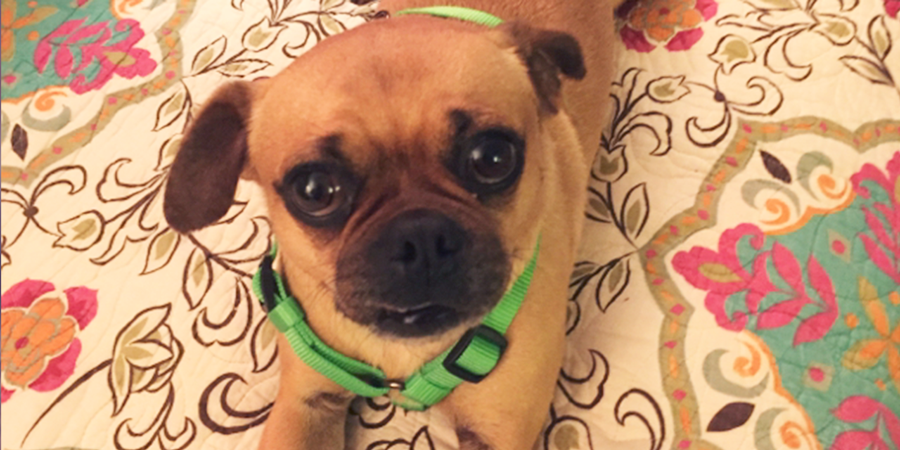My friend and fellow Blydyn Square Books author Everett De Morier has a theory when it comes to dogs.
He says a purebred dog is carefully created to DO something—whether the job in question is retrieving or hunting or, in the case of the two pugs I had for 15 years, behaving like the Asian royalty they are and being waited on hand and foot by their human.
A mutt, on the other hand, has no specific function programmed into its genes and, therefore, Everett says, it can just be a DOG.
Until I met my new dog, Rosco, I had no direct evidence of the accuracy of Everett’s theory in practice. But now? Call me a convert.
To get technical, Rosco is what they call a chug—a deliberate mix between a pug and a chihuahua. But no matter what fancy name you give a dog made from two different breeds—Labradoodle, Puggle, Chug—let’s face the facts: It’s a mutt.
And I couldn’t be happier with my little mutt.
Don’t get me wrong: My pugs, Caesar and Chip, were great dogs. I loved them more than any human parent could ever love an actual child (I’m intense like that ????). But they were a LOT of work.
Bred to be lapdogs, pampered and praised, my pugs refused to do much of anything beyond eating and resting, no matter how much I might want them to do it.
Sit? Only if there’s a snack involved, thank you.
Go for a walk? Only if it was THEIR idea and the weather was neither rainy nor above 60 degrees Fahrenheit.
Besides being picky about what commands they’d deign to obey, they also demanded homemade food and absolutely refused to eat anything store-bought. I spent hours every week creating a gourmet concoction of chicken, sweet potatoes, broth, and vegetables that would rival the entrees in most of the restaurants I’ve tried lately.
My pugs were not exactly dogs.
They were, in more than just the sappy sense, my children. They didn’t exist to please me, like people expect a dog to do. Instead, it was MY role to please THEM.
And for 15 years, I had no idea that our relationship was in any way abnormal. When I’d complain about how difficult it was taking care of dogs, people would give me odd looks. It’s only now, in the “Age of Rosco,” that I’ve learned not all dogs require more work than your day job.
My little mutt Rosco? Is a whole different story.
His entire life (even after only knowing me and my dad, with whom I live, for about a month) is about making his humans happy.
From the time he gets up in the morning, crying and freaking out in sheer ecstasy at the mere sight of me in the kitchen, upset because he can’t quite kiss and hug me enough, until the time he crashes into sleep at night, his whole day is about looking for ways to make our lives richer and fuller.
Sure, his ideas for improving my life may differ a bit from mine—like, say, the walking. I already get plenty of exercise and could probably do without Rosco forcing me into an extra 3 to 4 miles a day. And I have to admit, it wouldn’t be my first choice to have a smelly dog tongue bathing my face every time I try to sit down and read.
But the point is, Rosco means well and everything in his brain is focused on making his humans happy. Being a source of unconditional love is his one and only job, and he does it extremely well.
Plus, he eats dry kibble straight out of the bag—no muss, no fuss, and no sweet potatoes. Victory!
So, kudos, Everett De Morier. Your mutt theory? Is right on the money.
You can read more about Everett’s theories on dogs, food, and other vital topics at his website—www.everettdemorier.com—and in his soon-to-be-published collection of essays, The Invention of Everything: Insights on Life, Food, and One Good Thermos (available for preorder at https://www.amazon.com/Invention-Everything-Insights-Life-Thermos-ebook/dp/B07F228C89/ref=sr_1_2?ie=UTF8&qid=1530616100&sr=8-2&keywords=everett+de+morier).







